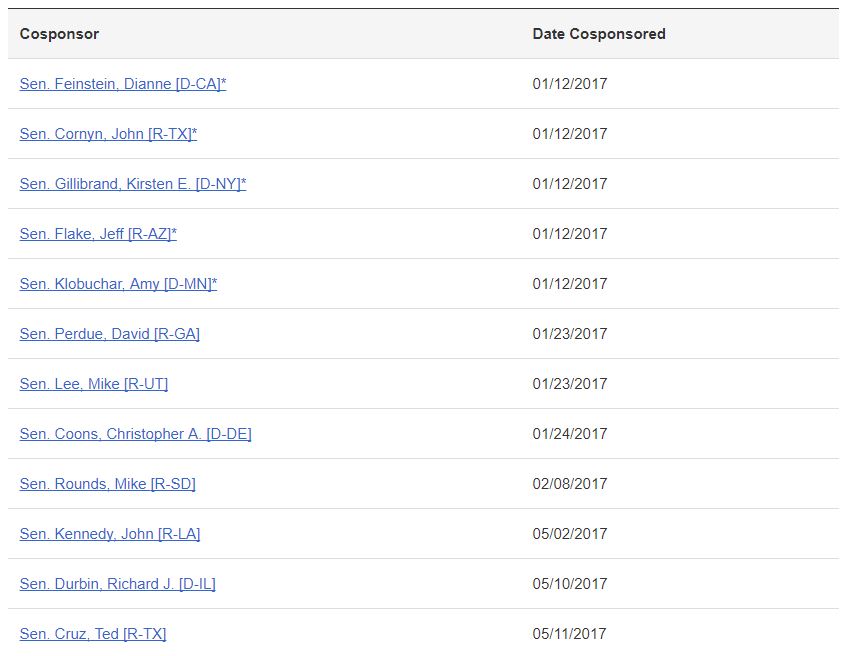With No Debate, US Senate Extends Warrantless Surveillance To 2023
After delaying a public debate on extending the controversial section 702 of the Foreign Intelligence Surveillance Act (FISA), as well as expanding NSA’s surveillance powers, for many months, the Senate voted yesterday not to have any debate before they vote on whether or not to pass the bill.
Five senators tried to filibuster the vote to end the debate, but the supporters of the surveillance bill extension were eventually able to get 60 senators that would vote against the debate, and thus bypass the filibuster.
Today, the Senate voted 65-34 to extend FISA for another six years (a year longer than the 2012 extension extension, and two years longer than the original bill’s four year-term). The bill was largely bipartisan, having seven Republican and five Democrats as co-sponsors.
Senators Dianne Feinstein (D-CA), John Cornyn (R-TX), Kirsten E. Gilibrand (D-NY), Jeff Flake (R-AZ), and Amy Klobuchar (D-MN) were the original co-sponsors who introduced the bill last month.
No Reforms Were Allowed
Besides there being no debate in the Senate, and little debate in the House, the leaders of the House and Senate also didn’t allow reform bills to reach the Congress floors, according to the EFF. The senators were denied the opportunity to vote on bills and amendments that would bring strong reforms to the FISA surveillance bill.
Cindy Cohn, Executive Director at the EFF and civil liberties attorney, said:
This means six more years of warrantless surveillance under Section 702 of the FISA Amendments Act. This is a long-abused law marketed as targeting foreigners abroad but which—intentionally and by design—subjects a tremendous amount of our Internet activities to government review, as they pass through key Internet checkpoints, and as they are stored by providers like Google and Facebook. Ultimately, the NSA uses Section 702 to sweep in and retain the communications of countless non-suspect Americans.
Get Tom's Hardware's best news and in-depth reviews, straight to your inbox.
EFF To Redouble Its Efforts Going Forward
The EFF has already been involved in several lawsuits related to NSA’s surveillance programs, but it plans to do even more in the next few years, including bringing the FISA program in front of the Supreme Court.
The nonprofit will also continue to confront the NSA through Freedom of Information Act (FOIA) requests, in order to discover whether or not the government is secretly using the supposed “foreign intelligence” programs against Americans in court. The government has already admitted on several occasions that it has done so.
The EFF and ACLU have had a few failed attempts to sue the NSA in the past, because the courts argued that the organizations didn’t have standing. The EFF said it will continue to look for cases in which it can participate and where the victim has evidence of being illegally surveilled under these warrantless programs and therefore have standing in court, too.
The EFF also noted that it will continue to support projects that help internet users become more secure against mass surveillance, such as the HTTPS Everywhere extension and Certbot, a tool to automatically deploy Let’s Encrypt certificates on your site.
Lucian Armasu is a Contributing Writer for Tom's Hardware US. He covers software news and the issues surrounding privacy and security.
-
Onus This might be a good time to remember that, when push comes to shove, oathbreaker lives don't matter.Reply -
shrapnel_indie Feinstein cares little of anybody's rights but her own and her "superior" friends. I certainly hope someone's efforts for a "New California" come to fruition.Reply
How the heck did they (and who are the responsible people) for killing any reforms to this invasion of privacy and unconstitutional legislation? My vote will show my displeasure if it was one of my representatives and/or senators. Also where can I find the list of how they voted? -
toadhammer Votes:Reply
https://www.senate.gov/legislative/LIS/roll_call_lists/roll_call_vote_cfm.cfm?congress=115&session=2&vote=00011#position -
secretxax The founding fathers would have endless discussions on all the freedoms being broken today in the USA. What a country...Reply -
kyotokid ...keep spying on citizens, kill the neutral Net to stifle the flow of information and free expression based on ability to pay, purge data that supports facts from government scientific databases, refer to all news sources that criticise the current administration as being "fake" and yeah, the pattern for totalitarianism is set.Reply -
Davil Tom's you guys really need to stop trying to be political because you are just spreading misinformation like crazy. Since about no one here seems to know what is actually in the FISA bill, which has been around since 1974 by the way, allow me to educate you all just a little.Reply
"The President may authorize, through the Attorney General, electronic surveillance without a court order for the period of one year, provided that it is only to acquire foreign intelligence information, that it is solely directed at communications or property controlled exclusively by foreign powers, that there is no substantial likelihood that it will acquire the contents of any communication to which a United States person is a party, and that it be conducted only in accordance with defined minimization procedures."
So in short, it requires the president to get authorization with concurrence from the Attorney General in order to wire tap someone that is not a US Citizen in an extreme situation. So if you are a US citizen it still requires a warrant. So take off the tin-foil hats and stop thinking that the government actually cares about what you do on a daily basis. -
toadhammer Reply20619500 said:Tom's you guys really need to stop trying to be political because you are just spreading misinformation like crazy. Since about no one here seems to know what is actually in the FISA bill, which has been around since 1974 by the way, allow me to educate you all just a little.
"The President may authorize, through the Attorney General, electronic surveillance without a court order for the period of one year, provided that it is only to acquire foreign intelligence information, that it is solely directed at communications or property controlled exclusively by foreign powers, that there is no substantial likelihood that it will acquire the contents of any communication to which a United States person is a party, and that it be conducted only in accordance with defined minimization procedures."
So in short, it requires the president to get authorization with concurrence from the Attorney General in order to wire tap someone that is not a US Citizen in an extreme situation. So if you are a US citizen it still requires a warrant. So take off the tin-foil hats and stop thinking that the government actually cares about what you do on a daily basis.
I'm going to (poorly) interpret the below excerpts from the text of the bill, and some others I didn't include. The FBI doesn't need an order from the Court if they claim terrorism, and the Attorney General can use anything in legal proceedings against you if they claim terrorism. If they don't contact the court, they don't need to restrict it to a year or a non-citizen. Worst case they need to annually report the quantity of citizens they target (rounded to the nearest 500). And all this only "limits" the FBI. If they get info direct from NSA it is a (questionable? illegal?) end-run around even this bit of "protection" of your rights. Oh, and beyond all this there's also a big old explicit exception for National Security, but it's not clear what the results of that are.
“(E) EXCEPTION.—The requirement for an order of the Court under subparagraph (A) to access the contents of communications described in such subparagraph shall not apply with respect to a query if the Federal Bureau of Investigation determines there is a reasonable belief that such contents could assist in mitigating or eliminating a threat to life or serious bodily harm.
“(A) IN GENERAL.—Any information concerning a United States person acquired under section 702 shall not be used in evidence against that United States person pursuant to paragraph (1) in any criminal proceeding unless
... or
“(ii) the Attorney General determines that—
“(I) the criminal proceeding affects, involves, or is related to the national security of the United States;

